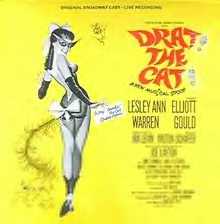History
Ira Levin got the idea for the show in 1957 and began writing in May 1961. The work was titled Cat and Mouse during its development until Gunter Grass put out a book of the same name, prompting Levin and crew to change the name. "I didn’t like it then, I don’t like it now," he wrote in 2005. "Several critics didn’t like it either. (More advice for young playwrights: Never use two exclamation points in a title. One, you can get away with; two, no.)" [2]
In September 1965 the show debuted at the Shubert Theatre in Philadelphia for an out-of-town try-out, [3] and it ran for 11 previews. On October 10, the Broadway production at the Martin Beck Theatre, presented by Jerry Adler and Norman Rosemont and directed and choreographed by Joe Layton. It ran for only eight performances. The cast included Lesley Ann Warren, Elliott Gould, Charles Durning, Jane Connell, and Beth Howland. Conductor Herbert Grossman served as music director and Clare Grundman arranged the orchestral score. Warren won the Theatre World Award for her performance, and the show was nominated for a Tony Award for Best Scenic Design.
Music
Levin initially wrote the music himself despite a lack of experience in musical composition, and was eventually convinced by his agent Flora Roberts to allow Milton Schafer to write the music. [2]
A recording of the pre-Broadway Philadelphia show was released as a demonstration record Capitol Custom (TB-504) in 1965. Long after the show closed, Blue Pear Records issued an original cast album from a recording surreptitiously made during a live performance. Gould's wife at the time, Barbra Streisand, had a hit with her recording of "He Touched Me", a gender-reversed version of one of the show's songs, which went to number two on the Easy Listening chart. [4] On the B-side of that single, Streisand recorded "I Like Him", also from the show. [5] In 1997, Varèse Sarabande released a studio recording featuring Susan Egan, Jason Graae, Judy Kaye, Bryan Batt, Jonathan Freeman, and Elaine Stritch. The recording was produced by Bruce Kimmel.
This page is based on this
Wikipedia article Text is available under the
CC BY-SA 4.0 license; additional terms may apply.
Images, videos and audio are available under their respective licenses.
